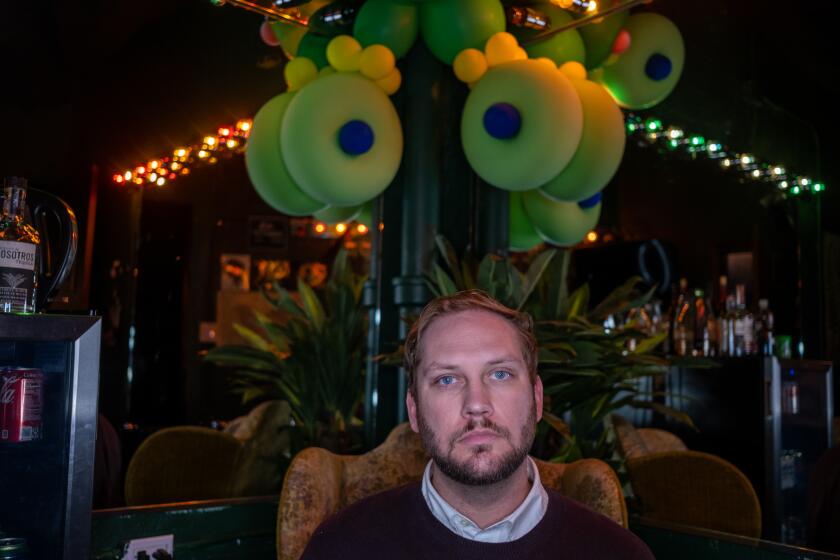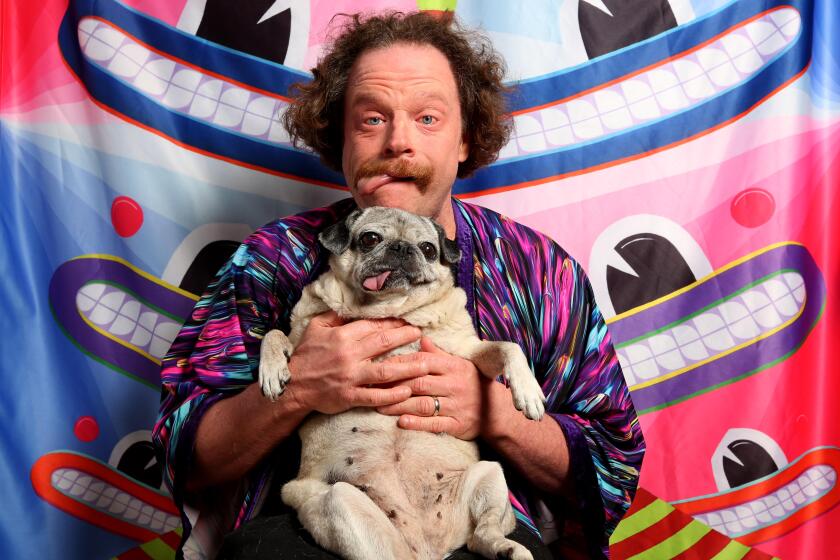Storyectomy: The Crow grants center stage to storytelling, comedy and cancer
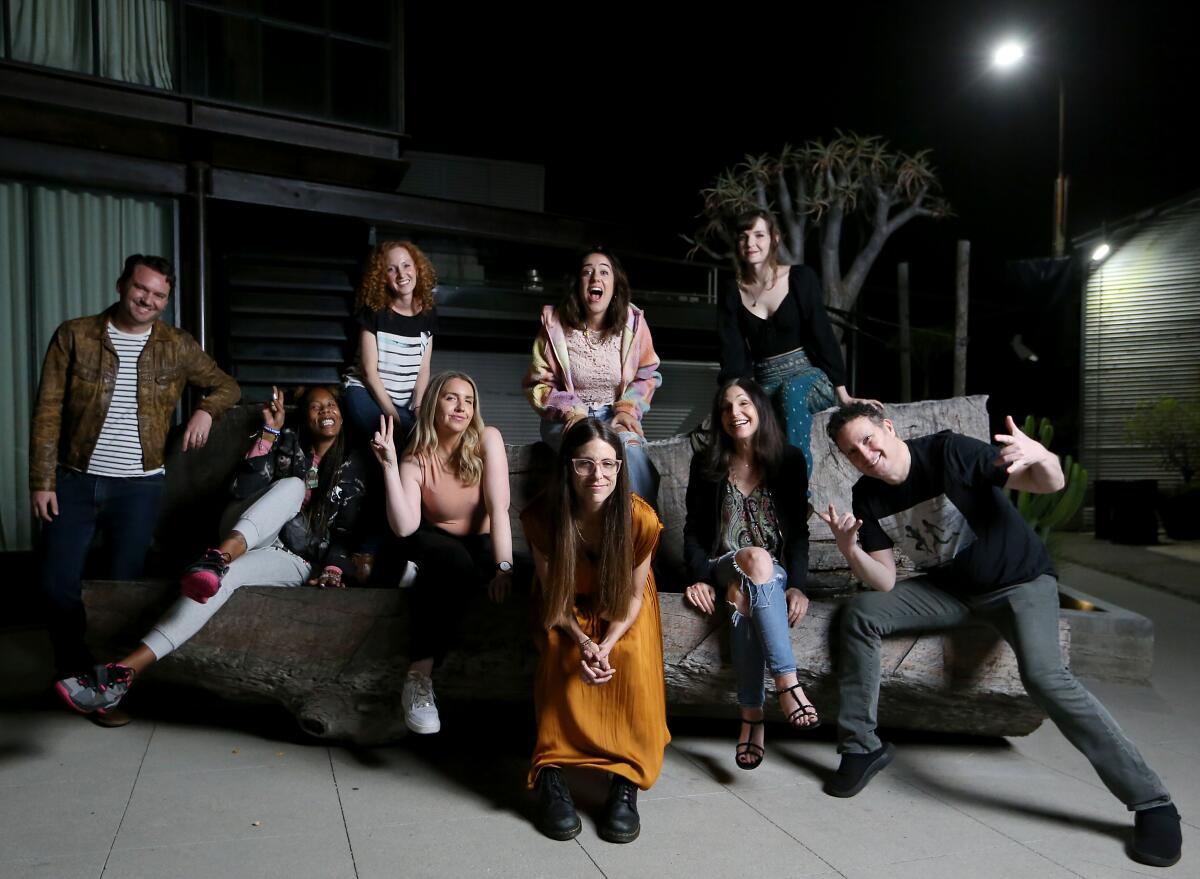
- Share via
They enter the venue doors hesitantly, first ensuring they’re in the right place, then introducing themselves as students of the storytelling class beginning tonight. The details stay sparse for now. There is time for full introductions over the next three hours of the class. Besides, a few of the eight haven’t even decided if they want to do this cancer show anyway.
Owner and founder Nicole Blaine welcomes them to the Crow, a progressive comedy theater off Olympic and 26th Street, tucked discreetly behind the art galleries and tasteful desert shrubbery populating Bergamot Station Arts Center.
For the record:
10:30 a.m. Oct. 5, 2023An earlier version of this article misstated the date of the next Storyectomy session as Sept. 6. The correct date is Oct. 6.
With Storyectomy — the Crow’s new storytelling class, and upcoming podcast series — Blaine is helping people laugh in the face of cancer. The goal is to help a group of beginners find their voices, refine their stories and jokes onstage and prepare a short showcase of material by the end of the course. After a final Thursday class, the Crow presents two Storyectomy showcases, at 7 and 9 p.m. Friday, Oct. 6, featuring pro stand-ups Robin Tran, Alex Hooper, Jerry Rocha and Dan Telfer.
The 65-seat venue celebrated its first anniversary on June 2. National submissions are open for the collective’s debut Bergamot Comedy Fest running April 1-6, 2024. Michelle Edgar, the new arts commissioner for the city of Santa Monica, recently stopped in to discuss the American Cancer Society’s Oct. 28 Making Strides walk.
As with other community-driven causes Blaine supports, a strong performance aspect pervades the class. This particular mental-health initiative gives “cancer survivors, thrivers and caregivers” space to share and connect.
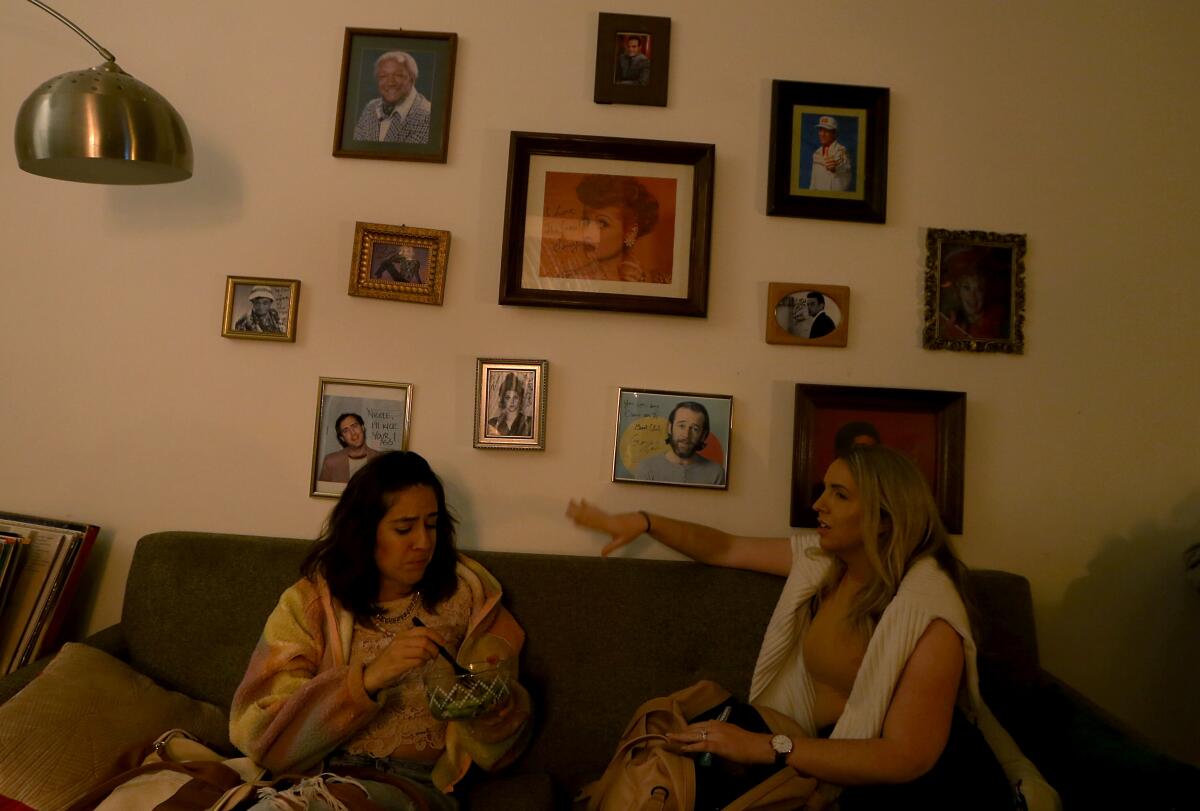
Participants complete six Thursday classes that, along with final showcases and all Storyectomy production needs, are sponsored by Blaine’s former employer RadNet, the nation’s largest provider of outpatient imaging services. (Co-founder, president and CEO Dr. Howard Berger is a leader in cancer research and advocacy, as well as Blaine’s maternal uncle.) An inaugural Storyectomy group of 10 participants ran through July with a debut showcase on Aug. 4. The lineup included pro comics Laurie Kilmartin, Dana Eagle and Jon Huck, each affected by cancer.
“Everyone who got up to tell their story, I could tell had pulled that story from a very real place in their life,” Huck recalls. “It’s a chance to be heard. To say the things out loud that they may have been afraid to say. The story that they thought would get them mocked or shunned for telling. It’s a weight lifted.”
Upstairs in the Nest, a cozy nook lined with books and woodsy side tables, Blaine introduces herself and how she found herself here. Her father’s diagnosis was a small part. She was sexually abused by her stepfather, who pulled her mother into cocaine and smoking crack. Blaine dropped out of college when her younger brother asked her to come back home.
The group follows suit with their own stories about what brought them here.
Sonya Jackson, who goes by “SJ,” was a government worker with no insurance when she was diagnosed in 2017. She lost her job and her car during six rounds of chemo and 36 rounds of radiation. Heart failure, a three-week coma and relearning to walk followed. Eight months ago, SJ was hospitalized with a stroke. She creates clothing and accessories, including custom fanny packs for carrying left ventricle assist devices, and is a motivational speaker.
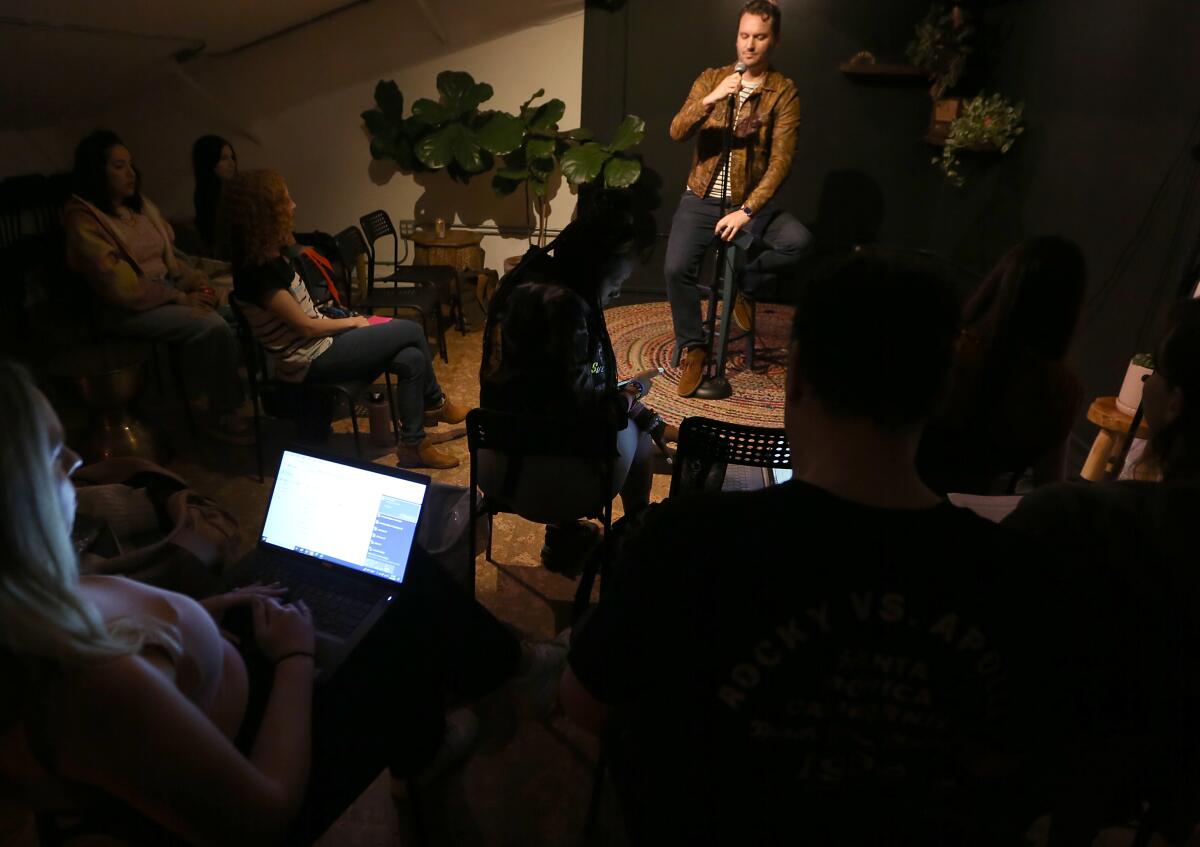
“We have to do a workup,” SJ remembers the nurses urging her. “A workup means they’re working up to let you die.”
Greg Tindale moved his family from Washington, D.C., to L.A. in August 2020. He was trying to become a comedy writer while parenting a 3- and 6-year-old during the pandemic when his wife was diagnosed. The role of caretaker came naturally, but tending to the needs of three family members and two pets was a lot. He needed an outlet outside of writers’ groups.
“She was actually part of the first Storyectomy class,” Tindale says of his wife, “but then she wasn’t ready to go through with it. And we’d already come up with everything that together she wanted to do. So…” The class giggles both to laugh at his joke and relieve the tension in the room.
Along with ongoing classes, a podcast series and a community presence at Making Strides, Blaine envisions Storyectomy chapters across the country, working with the American Cancer Society.
“We feel better after the biggest cry you’ve ever had or the biggest laugh you’ve ever had,” she says. “Why aren’t we all coming together to help each other get through that?”
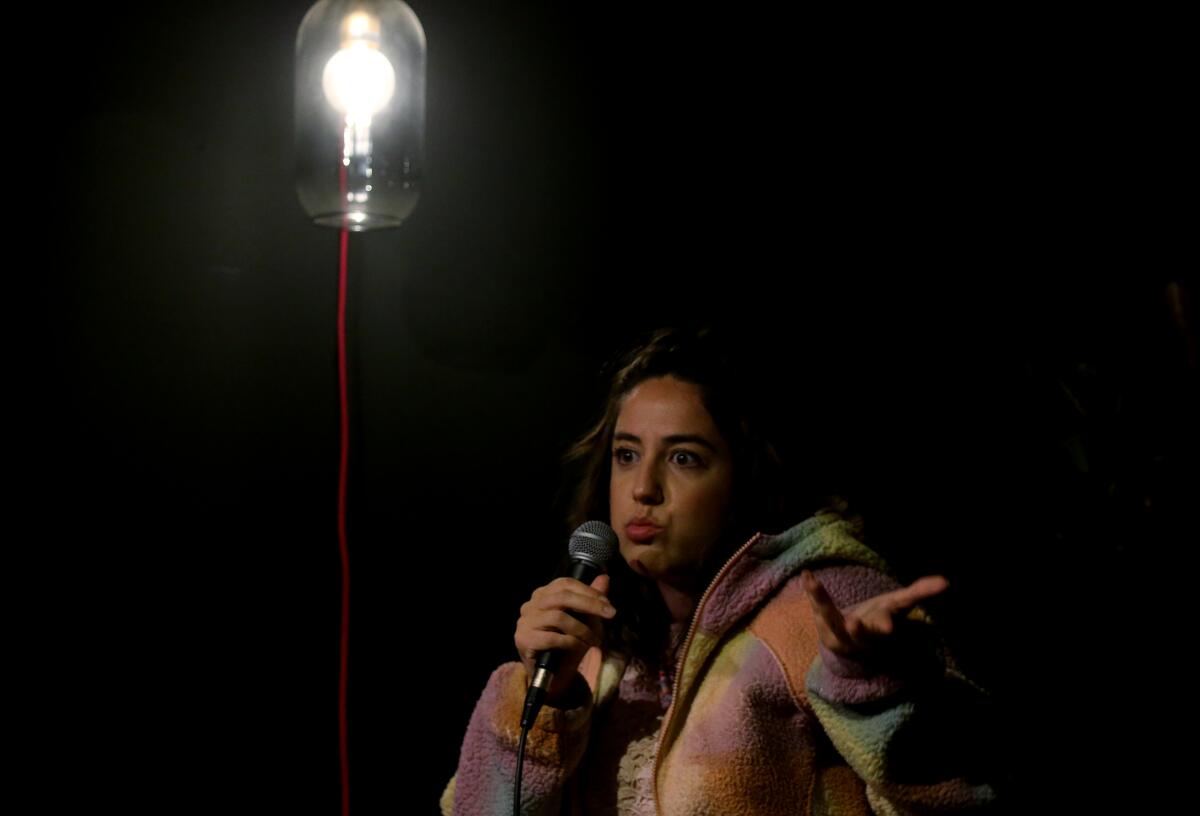
When asked the target set length, Blaine cites five to seven minutes. Along the way, students will learn how to kill lengthy material, discover classics like the Rule of 3 and learn how to accept feedback. Weekly homework assignments range from writing topics to analyzing why comic Tig Notaro’s 2014 “Conan” set — in which she joked about her bilateral breast cancer and double mastectomy — was funny.
A few weeks later, Blaine is called out of town for a funeral. Subbing is Jeffrey Jay from Texas City, Texas, who is a regular on the National Assn. for College Activities circuit and teaches a class called Writing Your Trauma. His mother was a judge; his father worked on oil tankers. He knows, he says, “how to make dark jokes funny.”
Tonight’s agenda: the benefits of clean comedy, the power of silence, mastering the microphone stand and aiming to get all stories in at under 10 minutes. One by one, each of the classmates begin to tell their stories.
Chelsea London Lloyd is obsessed with volunteering for kids’ grief camp to this day. She hosts the podcast “Dying of Laughter,” a “comedic take on grief” that features interviews with comedians who have lost parents or siblings. First, her father died of ALS. “Think Stephen Hawking but less active,” she jokes. Then her mother got diagnosed with cancer in her early 40s, just like her grandmother. “But don’t worry, cancer isn’t my whole personality,” Lloyd insists, “just my whole DNA.” Her mother has survived 25 years, but the pervasive stress remains ongoing.
Meredith Lynch’s mother had cancer for four years. An Irish Catholic upbringing meant no one wanted to talk about it. “She was really sick,” Lynch recalls. “But I never thought she was going to die. Dead moms were something that happened to American Girl dolls, and honestly, they made it look kind of cool … When I was 13, she told me she wasn’t going to die. And what my mother said, went. She said, ‘Hey, I have cancer, but I’m not dying.’ I said, ‘Fantastic!’ But that did not happen.” Lynch repeats the dialogue until she has it down, channeling the memory of her mother’s brusque cadence.
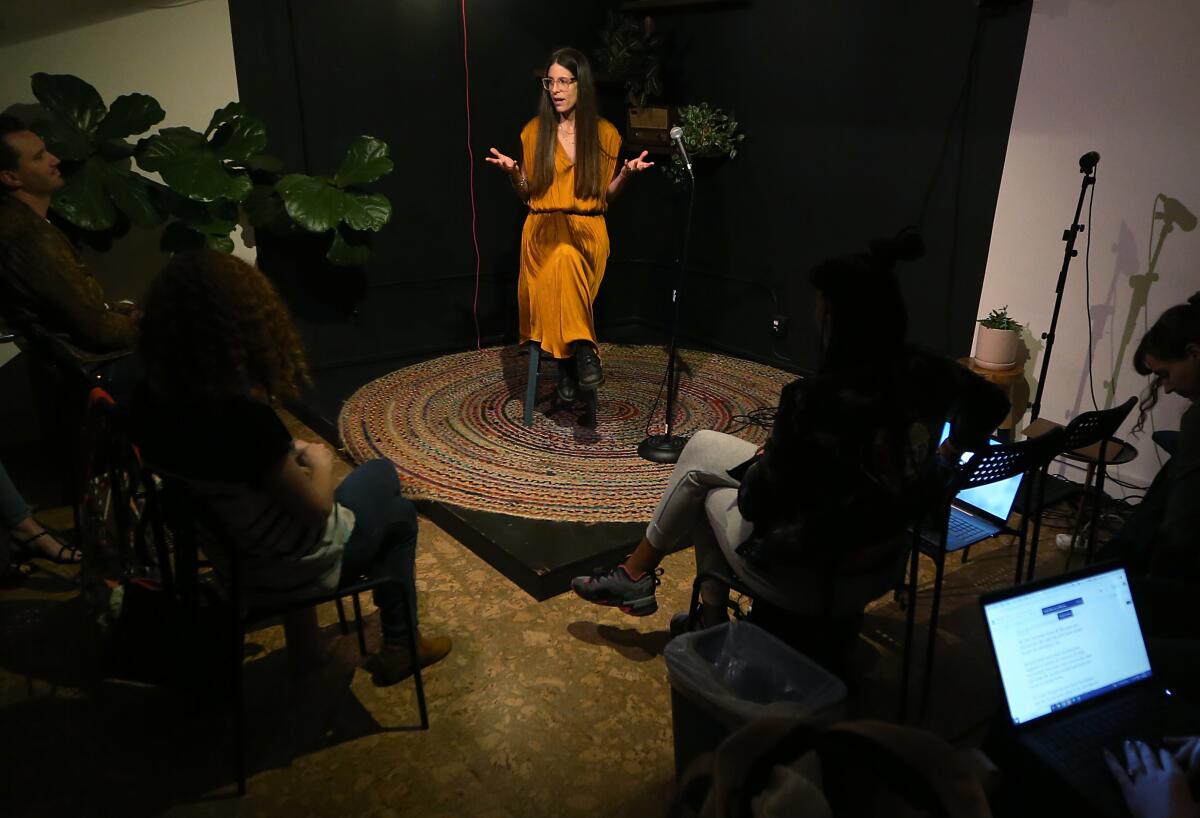
“Practice it and record it, leaving room for laughter,” instructs Jay.
After the stories receive group notes, a few minutes remain. He asks if anyone needs help narrowing down a thematic through line. A few storytellers remain stuck. Jay suggests that what you’re really trying to say might be something you may not be aware of. Laughter comes with a sense of recognition. “Comedy is cathartic,” he says, “and it helps you process things you might otherwise not have processed.”
Tindale, who initially joined to finish the project his wife started, agrees: “The class and performance has become solely my own and shifted to a personal level of catharsis and introspection about the cancer experience.”
Or as Blaine puts it, “Whether you’re on the stage or you’re in the audience, sometimes this is the art form that changes everybody’s life for better. Storytelling captures both the sad and the happy. Even if it’s fleeting. Being real and open to everyone in that room means you aren’t alone with it anymore.”
More to Read
The biggest entertainment stories
Get our big stories about Hollywood, film, television, music, arts, culture and more right in your inbox as soon as they publish.
You may occasionally receive promotional content from the Los Angeles Times.
